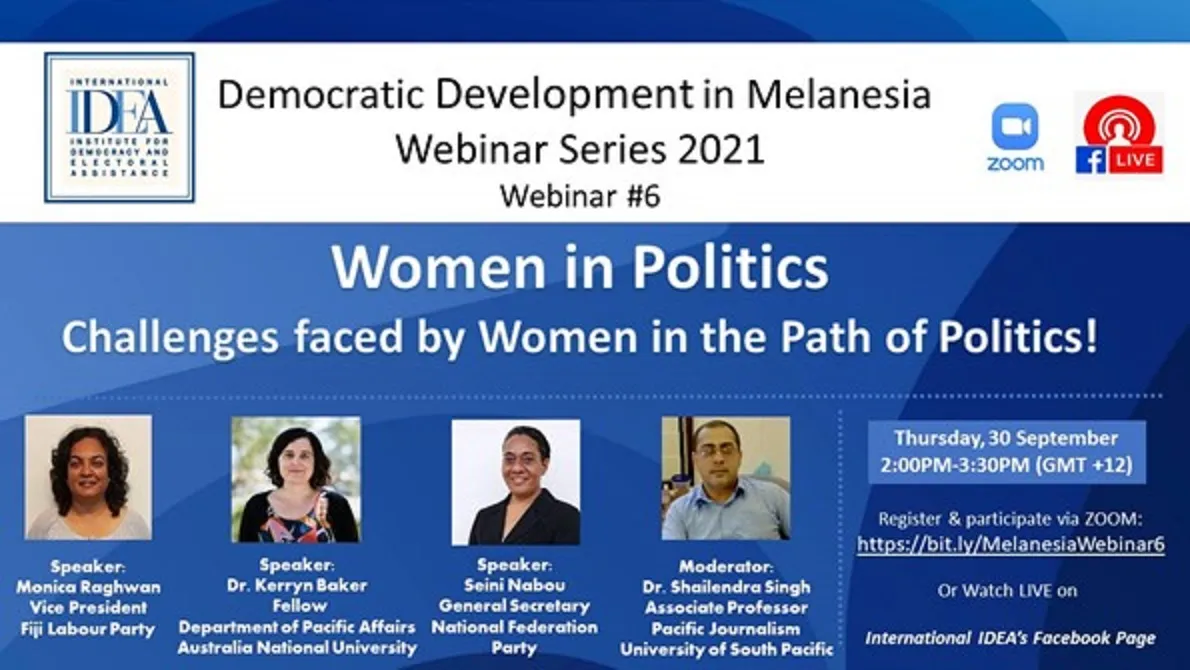Women in Politics- Challenges faced by Women in the Path of Politics in Fiji

As a build-up to the Annual National Forum on Women in Politics to be held on 27 October 2021, International IDEA’s Asia and the Pacific Regional Programme organized a webinar entitled “Challenges faced by Women in the Path of Politics”. This topic is relevant considering Fiji will go to polls some time in the second half of next year.
The sixth webinar in the Melanesian webinar series 2021 had speakers from two political parties in Fiji that have been active in politics for more than two decades. The two speakers shared their experiences and lessons learnt within their respective parties over the years. The third speaker, Dr Kerryn Baker, an expert in Government and Politics of Asia and the Pacific at the Australian National University, shared her research knowledge on women’s participation in politics in the Pacific.
One of the webinar's participants, Dr Andreas Kopf of the University of the South Pacific, synthesised that two major challenges were identified by the presentation of the three speakers. First, to convince and encourage women to become politically active and second, to change the social perceptions of women’s leadership skills and capabilities. While commenting on the above observation, Seini Nabou, General Secretary of National Federation Party said that culture is a big challenge when it comes to the perception of voters on women’s leadership abilities. In order to overcome these challenges, the Party tries to bring in changes that are organic and felt from the heart of the voters rather "charging in with a feminist view". She further adds that the media has a critical role in enhancing women’s participation in politics. Ms Nabou suggested that the media needs to improve on “the framing and the optics of women” in their reporting. Through an example, she explained that if “the media articles talk about women’s dress sense in parliament rather than their work” then the media is not helping in promoting women’s leadership capabilities.
While agreeing with Ms Nabou, Monica Raghwan, Vice President of the Fiji Labour Party, also thinks that the media can do much more for women by giving them more space. Ms Raghwan suggested that more emphasis should be given to training women for leadership roles and acknowledge the tremendous work of FemLink Pacific in this and International IDEA’s Forum on women in politics which gives a space to identify issues and discuss solutions. She explained that “some women are very good in discussion at a table but they may not be able to express themselves in the public.” Thus, she recommends that training women to build confidence will also boost women’s representation in parliament.
While agreeing to both Ms Nabou and Ms Raghwan’s thoughts, Dr Baker said one cannot separate women’s political representation and leadership from gender equality issues. She further added that “having women in politics is one part of the solution and it is not the whole solution.” Dr Baker emphasized that to improve the chances of women to be successful in elections, an Electoral Cycle approach or a long-term approach must be taken rather than merely supporting women three or six months out from elections. International IDEA has the Electoral Cycle tool available for the public at no cost on its website. Dr Baker went on to say that women need to understand the local political economy and the “rules of the game,”; not just the formal rules of how politics is on the ground and how voters perceive them.
The webinar had other interesting discussions, which can be viewed on the International IDEA Facebook page. More discussions will take place at the National Forum on Women in Politics 2021 to be held online and onsite in Suva, Fiji, on 27 October 2021, from10:00 to 16:00. The Forum will explore the following: “What Obstacles Women Politicians Must Overcome to Be Successful in Elections?”.




